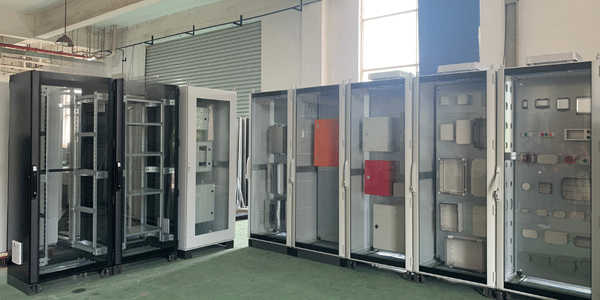How Electrical Fiberglass Boxes Improve Electrical System Reliability and Performance
6/12/20244 min read


Electrical fiberglass boxes are a crucial component in modern electrical systems, offering a range of benefits that enhance both reliability and performance. These boxes are primarily made from fiberglass, a composite material consisting of fine glass fibers embedded in a resin matrix. The manufacturing process involves weaving the glass fibers into a fabric, which is then saturated with resin and cured to form a rigid structure. This results in a material that is not only lightweight but also possesses remarkable strength and durability.
One of the standout features of fiberglass is its resistance to corrosion. Unlike metal, which can rust and deteriorate over time, fiberglass remains unaffected by moisture and harsh environmental conditions. This makes it an ideal choice for outdoor and industrial applications where exposure to the elements is a concern. Additionally, fiberglass is non-conductive, offering excellent insulation properties that protect against electrical interference and reduce the risk of short circuits and other electrical faults.
There are several types of electrical fiberglass boxes available on the market, each designed to meet specific needs. Junction boxes are commonly used to house electrical connections and provide a safe enclosure for wiring. Enclosures, on the other hand, are larger and can accommodate entire electrical panels, protecting them from dust, moisture, and other contaminants. Splice boxes are specialized containers used for joining and protecting cable splices, ensuring a secure and reliable connection.
These fiberglass boxes find applications across various sectors, including residential, commercial, and industrial settings. In residential systems, they provide safe and durable housing for home electrical installations. In commercial and industrial environments, they protect critical electrical components, ensuring the continuous and efficient operation of machinery and equipment. Overall, the unique properties of electrical fiberglass boxes make them an indispensable element in maintaining the integrity and functionality of electrical systems.
Enhancing Reliability in Electrical Systems
Electrical fiberglass boxes play a pivotal role in enhancing the reliability of electrical systems. Their unique properties offer significant advantages over traditional materials such as metal and plastic, primarily due to their superior durability and longevity. Fiberglass, renowned for its robustness, stands up exceptionally well against various environmental factors that typically compromise the integrity of other materials.
One of the key attributes of fiberglass is its resistance to moisture. Unlike metal, which is prone to rust, or plastic, which can degrade over time, fiberglass remains unaffected by prolonged exposure to humid conditions. This resistance ensures that the electrical components housed within these boxes remain dry and operational, thereby minimizing the risk of moisture-induced electrical failures.
Additionally, fiberglass boxes exhibit excellent resistance to UV radiation. Prolonged exposure to sunlight can cause plastics to become brittle and metals to corrode, leading to potential system failures. Fiberglass, however, maintains its structural integrity under intense UV exposure, ensuring that the electrical systems continue to function optimally without the need for frequent maintenance or replacement.
Temperature variations pose another challenge to the reliability of electrical systems, but fiberglass boxes rise to the occasion. They can withstand extreme temperatures without warping, cracking, or expanding, unlike some metals and plastics. This thermal stability ensures that the electrical components remain securely housed and protected, regardless of external temperature fluctuations.
Moreover, the inherent strength of fiberglass provides superior protection for electrical components against physical impacts. This robustness reduces the risk of damage due to accidental knocks or falls, which can otherwise lead to costly repairs and downtime. By safeguarding the integrity of the electrical components, fiberglass boxes contribute to maintaining consistent system performance over time.
In conclusion, the use of electrical fiberglass boxes significantly enhances the reliability of electrical systems. Their resistance to moisture, UV radiation, and temperature variations, coupled with their physical durability, ensures that electrical components remain protected and functional, thereby reducing the risk of electrical failures and extending the lifespan of the system.
Boosting Electrical System Performance
Electrical fiberglass boxes play a pivotal role in enhancing the overall performance of electrical systems. One of the primary advantages of these boxes is their superior insulation properties. Fiberglass, as a material, is inherently non-conductive, which means it effectively minimizes electrical interference. This reduction in interference is crucial for maintaining signal integrity, particularly in environments where multiple electrical signals are transmitted simultaneously. The improved insulation properties ensure that signals remain clear and uncorrupted, thereby enhancing the reliability and performance of the entire system.
The ease of installation and maintenance associated with electrical fiberglass boxes further contributes to their performance enhancement capabilities. Unlike traditional metal enclosures, fiberglass boxes are lightweight, making them easier to handle and install. This ease of installation translates to reduced labor costs and shorter installation times. Additionally, fiberglass boxes are resistant to corrosion and other environmental factors, which significantly reduces the need for frequent maintenance. The reduced maintenance requirements lead to decreased downtime, allowing electrical systems to operate more efficiently and reliably over extended periods.
Another notable feature of electrical fiberglass boxes is their customization potential. These boxes can be tailored to meet specific system requirements, providing bespoke solutions that optimize performance. Whether it involves custom sizes, shapes, or configurations, fiberglass boxes offer unparalleled flexibility. This adaptability ensures that the enclosures can accommodate unique components and complex wiring systems, facilitating seamless integration into diverse electrical setups. By catering to the specific needs of a system, customized fiberglass boxes help in maximizing performance and ensuring that the electrical system operates at its peak efficiency.
In essence, the use of electrical fiberglass boxes significantly boosts the performance of electrical systems through superior insulation, ease of installation and maintenance, and extensive customization options. These attributes collectively contribute to enhanced signal integrity, reduced downtime, and optimized system operations, making fiberglass boxes an indispensable component in modern electrical infrastructure.
